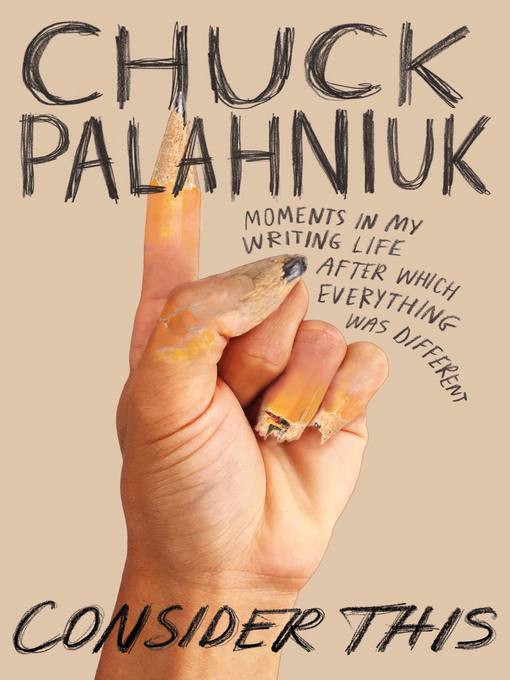
Consider This
Moments in My Writing Life after Which Everything Was Different
کتاب های مرتبط
- اطلاعات
- نقد و بررسی
- دیدگاه کاربران
نقد و بررسی

Starred review from November 18, 2019
Palahniuk (Adjustment Day) delivers a fine book on writing, full of advice and anecdotes garnered from his career as a novelist, that will help both those aspiring to write bestsellers and those hoping to write from the heart. His practical tips range from the importance of surprising one’s readers to the need to torment one’s characters. He concludes the book’s nuts-and-bolts component with a troubleshooting chart (he asks those whose beginnings don’t hook readers, “Do you begin with a thesis sentence that summarizes, or do you begin by raising a compelling question or possibility?”). Palahniuk also writes about his own life, in recurrent “Postcards from the Tour” sections on the joys and trials of being a famous author (the latter including an incident when a book-signing attendee, angered that Palahniuk refused to sign a Don DeLillo novel, attacked him with a tube full of mice). The book finally rises to a moving emotional crescendo, in a final chapter that shares moments of serendipity from Palahniuk’s time on the road. Reminiscent of Stephen King’s On Writing in never failing to entertain while imparting wisdom, this is an indispensable resource for writers. Agent: Dan Kirschen, Sloan Harris, ICM Partners. (Jan.)Correction: An earlier version of this review incorrectly noted that at one point Palahniuk was attacked by a fan bearing a tube full of dead mice. The mice, in fact, were not dead.

Starred review from January 10, 2020
Palahniuk (Adjustment Day) mines our free-floating anxiety, horror of the ever-accelerating Real, and returns with literary artifacts. One of these, the short story "Guts," has caused a few live-reading attendees to faint. Beyond such dramatic (but factual) accounts, this volume stands apart from similar writing-life books via Palahniuk's integral fidelity: no hand-holding allowed. Psychology tells us that shock--among other emotions--imprints on memory, for good or ill. But Palahniuk, maintaining forensic-strength attention, is no mere outrage-monger. The chapter "Establishing Your Authority" exemplifies how anyone feeling ripped off by predatory capitalism can find in his work calls for critical thinking and rebellion against "crisis culture." As a former assembly-line worker writing during "free" moments, the author learned that self-discipline is crucial, without which talent and craft are useless. "It's possible no one is as lonely as writers," says Palahniuk. "[A]nd reading is a lonely pastime." Like the author's fictive characters and their frequently violent struggles, these truisms infer that a meaningful life can be found only by really listening, observing, and cultivating self-reliance as antidotes against the world's chaos. Embracing the wildness of being.
VERDICT Palahniuk readers--and writers at any career level--likely will devour this vivid and instructive behind-the-scenes tour.--William Grabowski, McMechen, WV
Copyright 2020 Library Journal, LLC Used with permission.

November 15, 2019
Palahniuk (Adjustment Day, 2018, etc.) offers a comradely handbook on writing. After enduring a travesty of a writing workshop, the author resolved to produce a tough-love manual on fiction writing. Palahniuk's own work had benefited immeasurably from a different workshop conducted by Tom Spanbauer, whom he credits lavishly. A journalist by training, Palahniuk is known for a minimalist, conversational writing style and transgressive fiction featuring marginalized characters, but the strategies collected here can benefit any student of writing. Ranging from the nuts-and-bolts mechanics to the community of readers, his advice is highly detailed and practical, if occasionally tinged with romantic notions that belie his literary reputation for nihilism. And it's more than merely the tricks of the trade. Not surprising for a writer whose novel Fight Club was adapted for a successful film, Palahniuk illustrates many of his points using movie references and metaphors, sometimes to excess. He reveals possibilities that are not merely off the beaten track in publishing, but which possess a portion of originality. Many writers have pioneered the use of fictional techniques in writing nonfiction, but the author often reverses the process, to powerful effect. This is also a scrapbook of his writing life, brimming with personal anecdotes instructive, amusing, or bizarre. As in his stories, Palahniuk writes for the outsider in all of us, and he wants our wellsprings of story ideas to come from as deep a pool as his own. He closes with brief recommended fiction and nonfiction reading lists and a useful guide to troubleshooting. Palahniuk is a savvy teacher, though one's acceptance of the complete body of his guidelines may hinge on the appeal of his own fiction, his minimalist bent, or his insistence that writing also might be a form of exorcism: resolving intractable personal issues through fiction. The author confides one key dictum: Do not write to be liked but to be remembered. Constructive and accessible.
COPYRIGHT(2019) Kirkus Reviews, ALL RIGHTS RESERVED.

December 15, 2019
[Do] not write to be liked, Palahniuk (Adjustment Day, 2018) insists in his first book of advice for writers. Write to be remembered. It's the kind of pointer one might expect from the master of morbid fiction, but the subversive novelist also reveals surprising humility. Originally a journalist, Palahniuk credits his success to a kitchen-table MFA, the unofficial education he received from in-home workshops with respected writers. One thing he learned is to apply nonfiction forms to fictional structures, which he demonstrates by punctuating chapters on texture, authority, tension, and process with minimemoirs disguised as book tour postcards. Anyone looking to steal Palahniuk's bestseller-blueprints will find that he admits that there's no formula for success, though he does suggest some crowd-pleasing tropes, including voyeurism. Foremost, he says, writing is about enjoyment and catharsis. Palahniuk's snappy advice isn't always convincing, but he does offer fresh and accessible ideas. Fans will appreciate the insight into his own work, especially Fight Club (1996), his tributes to friends and forebears, and how he delivers gracious and encouraging wisdom in his characteristically conversational style.(Reprinted with permission of Booklist, copyright 2019, American Library Association.)

























دیدگاه کاربران